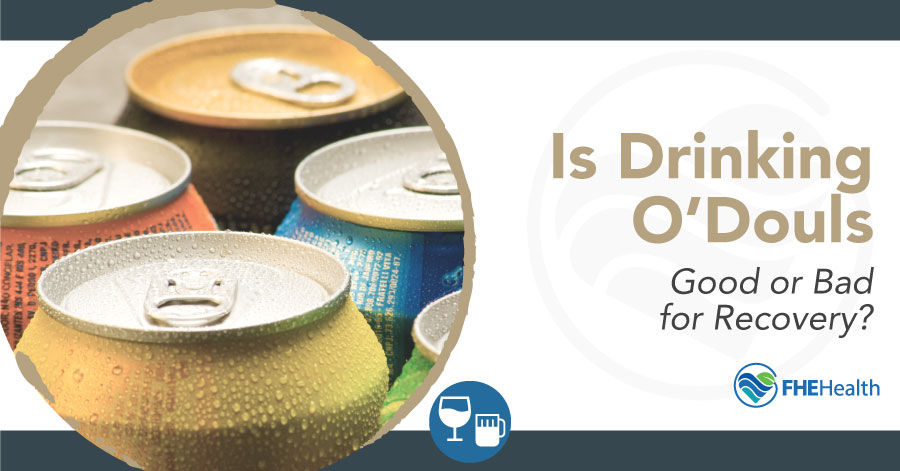
Recovering from alcoholism is difficult for a variety of reasons: It can feel like a lonely road, it takes away a coping mechanism the individual relies on, and it requires changing habits. To cope with the stress that accompanies the early stages of addiction treatment, many recovering from alcoholism wonder if switching to a zero-alcohol beer can make it easier to stay on track.
While a nonalcoholic beer may seem like an obvious way to continue enjoying the experience of drinking without the harmful aftermath, it’s generally best to avoid the scene entirely. Addiction is complex. Alcoholism goes beyond the simple act of drinking alcohol, and its treatment requires more than a simple swap.
Q&A
Is Nonalcoholic Beer Good for Detox?
Is Nonalcoholic Beer OK for Recovering Alcoholics?
Is NA Beer Good for Recovery?
Does O’Douls Have Alcohol?
Can I Replace Beer With Nonalcoholic Beer?
What to Drink as a Recovering Alcoholic
What Is Nonalcoholic Beer or Near-Beer?
As its name suggests, nonalcoholic beer, or “near-beer,” is beer that has little or no alcoholic content.
To understand whether there’s a place for nonalcoholic beer in recovery, a primer on the entry of this beverage option into the market is helpful. One of the more popular alternatives to alcoholic drinks, nonalcoholic beers trace their roots to the era of Prohibition, initiated by the Volstead Act in 1919, which effectively rendered alcohol illegal in the United States. During this time, any beverage with an alcohol by volume (ABV) of more than 0.5% was prohibited. This legal restriction prompted large breweries to craft “near-beer,” a pale, flavorless concoction sitting right at the 0.5% ABV limit.
Despite the end of Prohibition in 1933, nonalcoholic beer persisted due to consumer preference. Some drinkers still craved the taste of a nonalcoholic option, leading American brands to create milder, light beers that eventually evolved into full-alcohol brands.
How Is NA Beer Made?
Nonalcoholic beer starts its life as a regular alcoholic brew. After the fermentation process, it’s cooked at a low temperature. Because alcohol has a lower boiling point than water, it evaporates relatively quickly, leaving behind the nonalcoholic beer.
While the cooking process doesn’t necessarily change the appearance or consistency of beer, it does change its flavor profile. The more delicate flavors, which mainly come from the hops, are lost during processing. As a result, nonalcoholic beer tends to be maltier and has less flavor overall.
Resurgence and Staying Power: Nonalcoholic Beer
True nonalcoholic beers experienced a resurgence in demand during the craft and home-brewing revival of the 1990s. Driven by changing consumer habits and innovative brewing processes, craft breweries dedicated to nonalcoholic suds emerged nationwide, with industry giants investing millions to launch alcohol-free products.
Nonalcoholic Beer: Is It Really Alcohol-Free?
Despite the growing popularity of nonalcoholic beers, there are crucial considerations for recovery for those battling alcoholism. As in nonalcoholic beer’s inception, malt beverages and w
Can You Drink O’Douls in Recovery?
If recovering from alcoholism were easy, there would be far fewer individuals with alcohol addiction. The truth is that myriad factors come into play, from genetics and the home environment to an individual’s personal history with alcohol and even society’s cavalier attitude regarding excessive drinking.
Recovery is a lifelong process that, at times, can feel isolating and a little boring. If an individual is accustomed to being in a social environment where drinks flow freely, their friends may not share their personal commitment to sobriety.
At first glance, nonalcoholic beverages such as O’Douls, which has a very similar taste, smell and texture to regular beer, may seem like a good swap for the real deal. For someone who’s given up alcohol but doesn’t want to give up their social life, it can feel like a way to stay connected and continue to enjoy shared experiences with friends without compromising the recovery process.
Unsurprisingly, though, mental health experts have mixed opinions on whether nonalcoholic beer is an effective option. Some believe nonalcoholic beer can be a tool for recovery, while others maintain it can trigger a relapse.
For individuals in recovery, questions arise about whether sobriety and nonalcoholic beverages can coexist. Is drinking nonalcoholic beer in recovery a mistake? Can alcoholics drink nonalcoholic beer? It’s vital to exercise caution, as some seemingly nonalcoholic options may still contain alcohol, potentially posing a risk to those striving to maintain sobriety. Checking product labels and consulting with healthcare professionals can help individuals make informed choices aligned with their recovery goals.
Why Drinking O’Douls May Be a Good Solution
Why Skipping the Nonalcoholic Beer Is the Better Choice
AA and Nonalcoholic Beer: What Do People in Recovery Say?
Programs such as Alcoholics Anonymous stress the importance of avoiding triggers that may prompt relapse. Rituals, or the specific routines that go along with addictive behaviors, are the first stage of addiction and a common trigger for those recovering from alcoholism. For some, their ritual may involve a certain glass, a specific place at home where they’d sit or a bar they preferred. Once an individual is triggered, the temptation to relapse is strong. By continuing to drink nonalcoholic beer and carrying out the same rituals, the person may sabotage their own success.
In a handful of cases, those recovering from alcohol addiction report that switching to a zero-alcohol beer is instrumental in staying on track. The vast majority of people, however, find the most success when they address their addiction and the people, places and objects associated with it. In this case, near-beer isn’t a tool for success but should be avoided, just like regular alcohol.
Help for Alcohol Addiction
At FHE Health, we specialize in helping those with alcoholism achieve sobriety and come up with a plan that supports our clients’ goals and promotes lasting lifestyle changes. If you or someone you love struggles with alcohol addiction or other substance abuse disorders, start down the road to recovery with the help of FHE Health. Reach out to FHE now.






